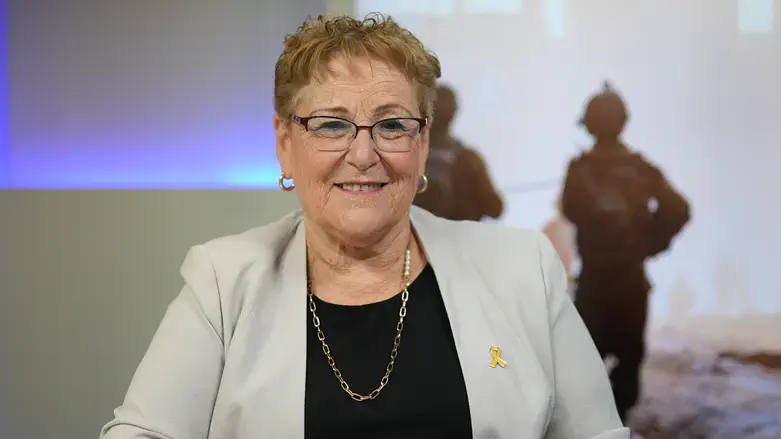
Israel Prize laureate Miriam Peretz, who lost two sons, Uriel and Eliraz, in the line of service, spoke with Arutz Sheva-Israel National News marking Memorial Day, which this year has become even more painful.
In the interview, she recounted her experiences since the Hamas massacre on October 7th and her fears for her son on the battlefield. "On Simchat Torah, I was here in Jerusalem with my son Elyasaf who lives across from a fire station. When I heard sirens I thought at first that it was something from the station, and then I saw that my son Elyasaf had come home from synagogue. He had left wearing white and a prayer shawl and came home quickly. I see him grab his phone and yell, 'It's a holiday.' He says to me, 'Mother, there's a problem in the south and I have to go.' And I don't understand what that means 'I have to go,' where? And within two minutes he's in uniform, tying his boots.
"I hold his bag and tell him: 'You're not going, I already paid the price. I can't experience the knock on the door another time. I am not able. Don't make me into a hero,'" Peretz recalls. "And then he answered me: 'Mom, you won't be able to stay here, nor will my children or my brothers, if I don't go.' When I heard this, I understood that this was out of the ordinary, and I changed my mindset. I didn't want to let him go feeling he didn't have support, that I was preventing him, and that he would only think about me. Eliraz always told me: 'I want you to forgive me because when I'm in battle, I won't think of you.' I got angry at him, and he explained: 'We are serving the people of Israel.' I told myself that my son Elyasaf needed to go with his mother's blessing. I went with him to the street and prayed, in my heart, that G-d would protect him and us all. After that, I didn't see him for nearly half a year. I didn't know that his brother Avichai, who was in Tel Aviv, had already left as well. It brought me back to the pain and fear of that knock on the door."
A few hours later, Peretz discovered that she had lost friends in the massacre and that the people of Israel lost many. "On Saturday night, I got a message that my dear friend Ofir Libstein, the Sha’ar Hanegev Regional Council chairman, fell. On Tuesday or Wednesday, I reached out to the families out of my own decision. No one reached out or called. I sat and listened on the radio to the names of the fallen and where each one lived. I have a list of the fallen and where they lived. I didn't know their exact addresses and when the shiva (mourning period) ended. I called friends and every day there was someone who drove me. I went to places that I was never in, and like that, I visited 60 bereaved families. At that point, the Defense Minister contacted me and asked that I go to parents whose children were killed at the party because I couldn't get to everyone. He organized a car for me and a driver from the military and from that day we went every day, from 8 in the morning until 11 at night."
She noted that the personal connection with the families is very significant, especially when there are so many dead. "Thank G-d, it is possible to pay attention to every family, and every family needs something different. Usually, with families that are religious, I found myself sitting with the family and being handed a microphone as they asked me to speak to everyone, and not just them. The family wanted to strengthen everyone, not just themselves, understanding that we all need strength, even those who came to console them.
"I saw an entire nation, not left, not right, but an entire nation that came to the families, people come from every corner of the country to console. And I noticed that it's different than the other wars that I was in. In all of the other wars, we had one story of heroism. Here, every home is a story of heroism, every family here is a story of heroism. I heard from them about an amazing love for the land. What did these children write in Gaza? 'I did it because I believe in this land and believe in this nation, and because I believe in the nation."
Recently, Miriam's grandson, the son of Eliraz of blessed memory, enlisted in the IDF. "Or-Hadash Uriel was six when his father fell. He enlisted in the Golani Brigade. I am so happy. I told him 'Or-Hadash, there are a lot of things you can do in the IDF.' But when you're raised on Golani ground, the kid won't go there? I wish him and all of the new draftees, that the order they received will be an order of peace, and the command they receive will be a command of life, and that they come back to us. Since this year's pain, of young widows, of babies who won't know their parents, of children who will grow up as orphans, of grandparents who survived Auschwitz and lost their grandchildren, explained to us that we must be good and deserving of these children. We must do everything so they grow up in a better world and in a country that is worthy of their fallen brothers, sisters, and parents."

